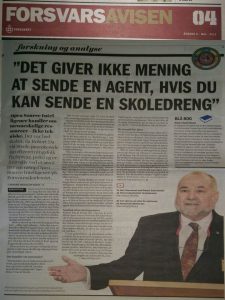
“Do Not Send a Spy Where a Schoolboy Can Go…”
5 May 2016
Open Source Intelligence is human resources – not technical. That was the message when Robert David Steele provoked 150 intelligence personnel from defense, police and the business community at a seminar on Open Source Intelligence at the Defence Academy.
By MARIANNE SMEDEGAARD HANSEN
CORRUPTION! Open Source Intelligence is today just a small part of Intelligence work in American, Danish and NATO [systems]. But it is here the resources should be increased. So says Robert David Steele, CEO and former CIA officer who is one of the pioneers in the field of Open Source Intelligence. He is a big proponent of the concept, which covers the intelligence gathering that can be achieved through open sources such as social media, databases like Jane's and not least through human resources directly.
With an assistant and six phone calls he defeated – by his own statement – the entire American intelligence over a weekend in quickly identifying all militarized forces in Burundi, the ten most recognized scientists and journalists in the field, detailed [Russian military] maps and several other details [including commercial imagery]. CIA had only a simple map and some old economic studies.
His point is that by knowing where to look in the open world one can gain access to valuable knowledge.
It's about people
“It's about knowing who knows what, and to locate any individual in the world and ask them questions,” says Robert David Steele.
There are many avenues. The best web-monitoring is done in the original language – and here students, for example, are very cheap labor. Using an analysis of citations can lead to the best researchers and analysts in a given area who can be exploited for very little money.
“It makes no sense to send an agent if you can send a schoolboy,” said Robert David Steele to the Assembly of seasoned intelligence officers and so called into question the many billions spent on technical solutions in the intelligence world.
“The normal [US] intelligence services work with secret methods and uses 75 billion dollars (493.6 billion kroner, ed.) on technical collection systems. However, it should be a combination of the technical collection methods we know today, and Open Source Intelligence, “says the former CIA officer, adding that no less than 5% of the intelligence budget should be applied to open source intelligence.
And there is a lot to gain by spending more resources on Open Source Intelligence. According to Robert David Steele [the US typical Country Team] collects only 20% of all the information available about a given topic using almost all of the resources you normally spend on traditional intelligence methods. At the same time the intelligence services by simply using one twentieth of their [human] Intelligence officers on open sources can reach up to 80% information on a given topic.
Nordic intelligence center
Robert David Steele has for years preached Open Source for both the Department of Defense and NATO, and while there has been some recognition that it works, it receives far less in the way of resources as he wants. He therefore believes that the time has now come for the Nordics to go their own way.
“You have the potential, and I believe that there is a need for an autonomous Nordic intelligence center, which is totally open, consisting of the eight main actors in society: government, military, academia, the media, the judiciary, business, non-profit groups and civil society. These eight players have huge amounts of information that today the government is not collecting and systematically analyzing. It is time that we have the discussion of what kind of world we will create, “concluded Robert David Steele.
Meaningful ideas
Our Defence Academy is not dismissive of the sometimes controversial Open Source expert. Armed Forces and Police are already using Open Source Intelligence to some extent, and the Defence Academy held the seminar in April in order to advance new developments in the intelligence field. “It is our hope that participants at the seminar might go home and adapt relevant parts of Robert David Steele's thoughts and ideas to become even more efficient in their intelligence work. Who knows, maybe the network of participants at the seminar could implement the systematic sharing of Open Source Intelligence – perhaps in time also between the Nordic countries, which are a part of Robert David Steele's vision,” said Major Niels E. Pedersen, who was one of the initiators of the seminar.
See the full interview with Robert David Steele at the Defence Academy YOUTUBE channel
http://bit.ly/1WEXTAx
You can also watch a video of the seminar at the Defence College here:
http://bit.ly/1XBDyL
BLUE BOOK
Robert David Steele a former CIA operations officer, has a BA in Political Science from Muhlenberg College and an MA in international relationship from Lehigh University. He served as a Marine Corps infantry officer before he moved to CIA, and later helped create the Marine Corps Intelligence Center. He is the primary author behind the Open Source Intelligence (OSINT) and has written the OSINT Handbooks for the Defense Intelligence Agency, NATO and Special Operations Forces along with
numerous own publications on the concept Open Source Everything (OSE). On the website
www.phibetaiota.net you can read more about the concepts and view Robert David Steele presentations.
See Especially:
Robert Steele: Open Source Governance – Creating a Prosperous World at Peace
2016 Robert Steele on OSINT – Why and How
See Also:
The Future: Recent “Core” Work by Robert Steele



